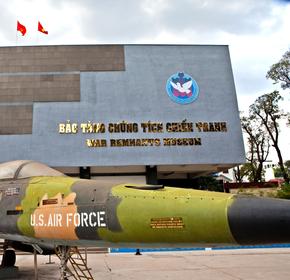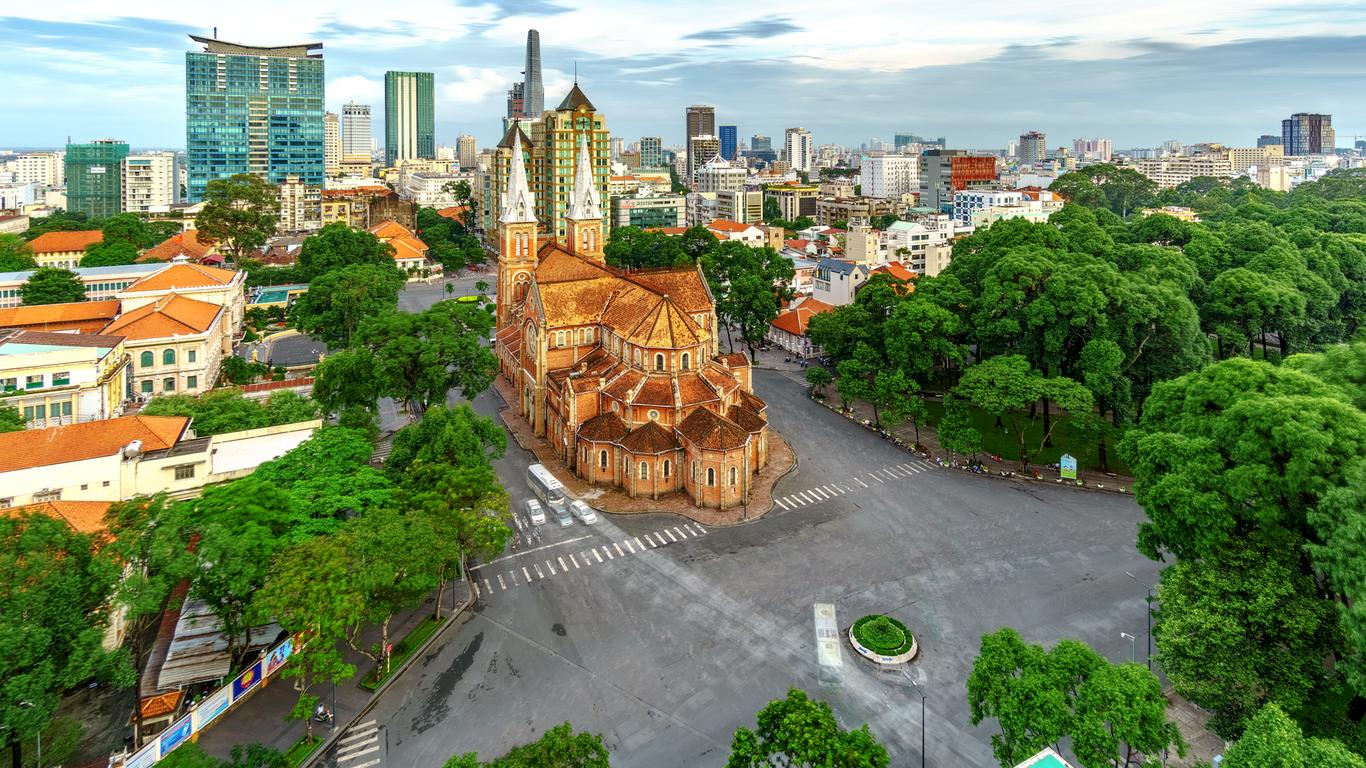
Ho Chi Minh City travel guide
Ho Chi Minh City Tourism | Ho Chi Minh City Guide
You're Going to Love Ho Chi Minh City
Prepare to be dazzled by Ho Chi Minh City, Vietnam's economic and cultural powerhouse. This is a city full of energy, where past and present come together, and where a new experience waits around every corner.
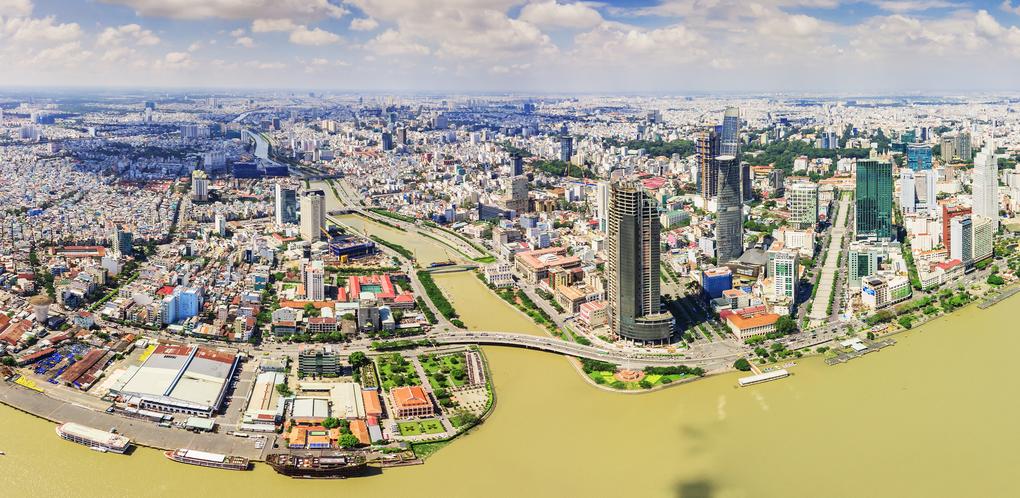
The city formerly known as Saigon came to prominence decades ago during the Vietnam War, and before that it was a French colony. You can still find traces of the past in modern Ho Chi Minh City, from the spectacular Notre Dame Cathedral to the decorative Central Post Office that dates from the 1800s.
Today the city of over 8 million thrives. Sleek skyscrapers give way to centuries-old alleyways, where you'll find temples and street stalls. It's a foodie's paradise, and there are entertainment options like the Dam Sen Water Park, motorbike tours of the city and area, and Urban Tales Cholon, a cross between treasure hunt and city tour.
Top 5 Reasons to Visit Ho Chi Minh City
1. Local Culture
Whether you choose to stroll through the city's historic alleyways, try some snake wine - yes, a wine made with snakes in the fermenting process - or attend the famous Night Market, you'll be enchanted by Vietnamese traditions.
2. The History
There is so much history to discover in Ho Chi Minh City. Checking out the Vietnam History Museum and War Remnants Museum are obvious choices, along with French colonial architecture like the Ho Chi Minh City Municipal Theatre, formerly the Saigon Opera House. Many of the city's prominent temples are also historic sites, such as the Jade Emperor Pagoda that dates from 1909.
3. Unparalleled Shopping
Vietnamese silks are world renowned for their quality and style, and along with the fabric, you'll find many local designers who make gorgeous items from it. You can also get bargains on electronics in the area of Huynh Thuc Khang, but beware of counterfeits.
4. The Foodie Scene
Along with local flavors, there are many Chinese, French, Japanese, and other options in a fast-moving dining scene. You can take tours of the city's world-renowned street food to help you sort out the dizzying number of options, including the Night Market that takes over when Ben Thanh Market closes each night.
5. The Nightlife
From cocktails in a sophisticated rooftop lounge to a noisy street bar full of backpackers, you'll find nightlife options for every taste and every price point in Ho Chi Minh City. There are high-rolling casinos, live music bars, and dance clubs to keep you up all night.
What to do in Ho Chi Minh City
1. War Remnants Museum: Enter with A Pouch of Salt
Better known as the War Remnants Museum, this public space pays homage to the Vietnam War and the first Indochina War. Visitors will enter a somber and historic mood as they move through the War Remnants Museum, with exhibits tracing both the artillery, machinery and effects of the war through photographs, real war aircrafts on display and models that mimic the conditions of prisoners of war. While it certainly attracts half a million visitors each year, visitors should approach exhibits with a sense of skepticism; the horrors of war are real but, at the War Remnants Museum, fact is often exaggerated and serves a greater purpose as propaganda by local government.
2. Presidential Palace: A Perfectly Preserved Palace
Iconic and grand, the Presidential Palace goes by several other names such as Independence Palace or Reunification Palace. Over the years, this has been a significant site of major coups (attacks that have left entire wings destroyed) and a seat for major occupying powers as well as local ruling government. After multiple bombing attempts and a major restoration project in 1962, the end of the Vietnam War in 1975 brought both factions of the country together. Today, the Palace's conference hall, basement of war rooms and tunnels, reception area and presidential living quarters are open for public tours.
3. Củ Chi tunnels: Find Your Footing in the Tunnels
So much of present-day Ho Chi Minh City is a preservation and a story from the War. The event caused a significant shift in the country's history and the Củ Chi tunnels, as they're better known, are a part of that tarried past. The underground tunnels crisscross beneath the city in a vast network that was used to support military combatants of the North Vietnamese fighters and move them through the country without them being detected. When you snake through the maze of tunnels, keep in mind that they're now widened and lengthened for visitors.
4. Saigon Central Post Office: From Vietnam, With Love
It may only be the "Saigon Central Post Office" but don't be fooled by the moniker; the building is as majestic and memorable as the Independence Palace and the architecture alone will capture your imagination. Inside, there are plenty of small, open-air shops and kiosks selling souvenirs and small collectibles like stamps and coins. Recognizing the that building is also a draw for visitors, the city has placed beautiful, hand-painted maps depicting the history and culture of Saigon around the interior.
5. Bitexco Financial Tower: Soaring High Above Ho Chi Minh City
In Ho Chi Minh City, a city of French colonial architecture and Vietnamese culture, the Bitexco Financial Tower stands out like a mark of the modern age. At 861 feet tall, it's a shining promise of progress and commerce in the historical city that has been the flashpoint of many previous struggles. The skyscraper features stunning views of the entire hazy city (and beyond!) that visitors can capture from the Saigon Skydeck.
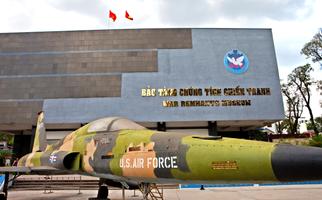
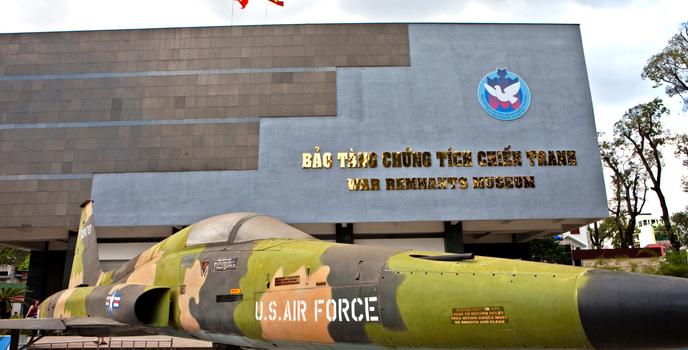
1. War Remnants Museum: Enter with A Pouch of Salt
Better known as the War Remnants Museum, this public space pays homage to the Vietnam War and the first Indochina War. Visitors will enter a somber and historic mood as they move through the War Remnants Museum, with exhibits tracing both the artillery, machinery and effects of the war through photographs, real war aircrafts on display and models that mimic the conditions of prisoners of war. While it certainly attracts half a million visitors each year, visitors should approach exhibits with a sense of skepticism; the horrors of war are real but, at the War Remnants Museum, fact is often exaggerated and serves a greater purpose as propaganda by local government.
2. Presidential Palace: A Perfectly Preserved Palace
Iconic and grand, the Presidential Palace goes by several other names such as Independence Palace or Reunification Palace. Over the years, this has been a significant site of major coups (attacks that have left entire wings destroyed) and a seat for major occupying powers as well as local ruling government. After multiple bombing attempts and a major restoration project in 1962, the end of the Vietnam War in 1975 brought both factions of the country together. Today, the Palace's conference hall, basement of war rooms and tunnels, reception area and presidential living quarters are open for public tours.
3. Củ Chi tunnels: Find Your Footing in the Tunnels
So much of present-day Ho Chi Minh City is a preservation and a story from the War. The event caused a significant shift in the country's history and the Củ Chi tunnels, as they're better known, are a part of that tarried past. The underground tunnels crisscross beneath the city in a vast network that was used to support military combatants of the North Vietnamese fighters and move them through the country without them being detected. When you snake through the maze of tunnels, keep in mind that they're now widened and lengthened for visitors.
4. Saigon Central Post Office: From Vietnam, With Love
It may only be the "Saigon Central Post Office" but don't be fooled by the moniker; the building is as majestic and memorable as the Independence Palace and the architecture alone will capture your imagination. Inside, there are plenty of small, open-air shops and kiosks selling souvenirs and small collectibles like stamps and coins. Recognizing the that building is also a draw for visitors, the city has placed beautiful, hand-painted maps depicting the history and culture of Saigon around the interior.
5. Bitexco Financial Tower: Soaring High Above Ho Chi Minh City
In Ho Chi Minh City, a city of French colonial architecture and Vietnamese culture, the Bitexco Financial Tower stands out like a mark of the modern age. At 861 feet tall, it's a shining promise of progress and commerce in the historical city that has been the flashpoint of many previous struggles. The skyscraper features stunning views of the entire hazy city (and beyond!) that visitors can capture from the Saigon Skydeck.


Where to Eat in Ho Chi Minh City
You can get a good fix of Vietnamese, Thai, and Chinese-style street food like Pho noodles or sticky rice at Nha Hang Ngon, set up in a garden with a number of food stalls. Mains start at just ₫60,000. Bloom Saigon Restaurant offers creative fusion cuisine in a restored mansion, with mains starting at ₫100,000. Soul Burger serves up creations named after American music legends like Little Richard, along with wings and other North American-style fare starting at ₫165,000.
When to visit Ho Chi Minh City
Ho Chi Minh City enjoys warm weather all year round, with daytime temperatures that average between 87 in December to 94 degrees Fahrenheit in April. The rainy season extends from May to November, with September the wettest month. It is a year-round destination, with an uptick in visitors between December and March, the sunniest time of the year.
How to Get to Ho Chi Minh City
Plane
Tan Son Nhat International Airport (SGN) is Vietnam's largest, and it is about four miles from District 1. Taxi is your best option to get into the city, with a main taxi queue just outside the terminal. A trip to District 1 should cost about ₫150,000 to ₫170,000.
Train
The Saigon Railway Station in District 3 is Vietnam's largest and a major railway hub. There are multiple trains daily that make the trip from Hanoi to Ho Chi Minh City and back via Vietnam Railways. It's about a 34-hour night trip that meanders along the coast for leisurely sightseeing.
Car
Foreigners are permitted to drive in Vietnam with a valid International Driver's License and local insurance. Highway 1 runs between Hanoi and Ho Chi Minh City but be advised that many people find driving in Vietnam chaotic and there are many accidents along the route.
Bus
Bus is a cheap option for travel between major centers in Vietnam, including Ho Chi Minh City, which has two main intercity bus terminals: Mien Dong and Mien Tay. There are many private companies offering varying types of service, from luxury air-conditioned models to budget-priced options. Hoang Long is one of the largest.
Airlines serving Ho Chi Minh City
Where to stay in Ho Chi Minh City
District 1 - this is the city's hyperactive center, where you'll find upscale hotels along with casinos, glamorous rooftop bars, and restaurants. Dong Khoi Street and Nguyen Hue Boulevard form the city's main commercial area.
Popular Neighborhoods in Ho Chi Minh City
District 3 - this is the city's mecca for backpackers and young travelers. Here, you'll find a lively and youthful scene of bars and budget-priced restaurants centered around Pham Ngu Lao.
District 5 - this is the city's Chinatown, where you'll find a great street food scene. It is also home to many of the city's most prominent pagodas and temples.
Where to stay in popular areas of Ho Chi Minh City
Most booked hotels in Ho Chi Minh City
How to Get Around Ho Chi Minh City
Public Transportation
There is an extensive bus service in Ho Chi Minh City, but the distances between stops can be significant, and some routes run infrequently. Fares vary by distance and range from ₫3,000 and ₫10,000.
Taxi
There are many taxis available in Ho Chi Minh City and they can be hailed from the street. Taxi service is unregulated in Ho Chi Minh City but is a good option for getting around town. Be sure to use metered taxis. A trip of about five miles should run approximately ₫124,654.
Car
As a visitor, you can drive in Vietnam with an International Driver's License, but the city's traffic is typically congested and chaotic, and rental cars are extremely difficult to find. Hiring a car with a driver is a good alternative, with rates starting at about ₫1,692,825 per day.
The Cost of Living in Ho Chi Minh City
Shopping Streets
For locally produced artisan crafts and goods, like lacquered bowls and plates, along with smaller fashion boutiques, you'll find the best bargains and quality around Dong Khoi and the surrounding streets. Ben Thanh Market is the city's largest outdoor market, with stall after stall of souvenirs. Cho Binh Tay, a market in Chinatown, has spices, silks, and other textiles.
Groceries and Other
You'll find multiple locations of Citimart and Co.op Mart Supermarkets with good selections and prices. Supermarkets selling Western products, like Parkson or Diamond Plaza, are generally much more expensive. A quart of milk costs about ₫30,410 and a dozen eggs is about ₫27,560.
